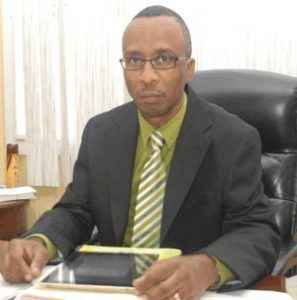FOR several years now, I have had the privilege of serving on several state boards and other committees. On the one hand, it is rewarding work, the primary benefit for me being the opportunity to serve my country.
However, the work, though voluntary, is as strenuous and demanding as any paid job, and like others similarly tasked, I’ve had to be creative in making sure that I deliver the best possible input into whatever role I undertook.

Over the years of my involvement in such activities, I would not have been able to stretch myself as admittedly thin as I have without the support of a cadre of young people, whose commitment has proven to me a debunking of the myth that our youth have little interest or ability when it comes to serious work.
Whereas, far too many see a position on a Board as a status symbol in itself, proof that they are a notch above the average citizen, I believe that not only does it represent the ability to prove one’s nationalism, but to transmit that sense of commitment as widely as possible while providing the opportunity for the upcoming generation to learn things that will be useful to them down the line.
The approach I’ve used is to explore the extent to which I could involve young people – once basic concerns of professionalism, confidentiality or conflict of interest are not breached – in supporting the work I am doing, and my payback has not just been the ability to carry out my assigned work easier, but a chance to see youthful innovation and inventiveness at work. Most importantly, the job that I’ve undertaken gets done – the board benefits, the entity benefits, and the country benefits.
Far too many young people in Guyana today are not afforded the avenues for the outlet for their intellectual energy. In contrast, there are a considerable number of people who have accumulated a wealth of knowledge in various fields. Several people I know who have served on boards or other policy-making mechanisms for years, as much as a decade or more in some cases, during which time they would have accumulated a fair amount of technical knowledge, in addition to institutional memory.
Quote: ‘Whereas, far too many see a position on a Board as a status symbol in itself, proof that they are a notch above the average citizen, I believe that not only does it represent the ability to prove one’s nationalism, but to transmit that sense of commitment as widely as possible while providing the opportunity for the upcoming generation to learn things that will be useful to them down the line’
For me, this falls into the realm of the issue of the transfer of knowledge, one which I’ve dealt with before in this column, and will return to again. For now, by way of example, I could say this: I have seen various organisations retain, over a number of years, various expatriate consultants to work on the very issue. What was missing from their operational model, in my estimation, was a mechanism in which knowledge pertinent to whatever needed to be fixed was transferred to local personnel, preventing the perpetual dependency of the respective organisations.
To be fair, I know at least one donor organisation I’ve worked with which had a practice of ‘twinning’ their consultants with local counterparts, although this is more the exception than the rule.
I would humbly suggest, and this is something I will give much greater development in a subsequent article, that perhaps a special mechanism be established when engaging not just donors but commercial enterprises as well.
 We are on the verge of tremendous ventures in exploitation of our petroleum resources, for example: I believe that a system of building incentive options – linking the sharing of specialist knowledge to specific benefits – into whatever agreements are being made can be a feasible option. I’m not speaking here of training of the local personnel on the entity’s workforce, which is a separate issue, but a ‘twinning’ of specialist personnel with tertiary education students, from either the University of Guyana or the various technical institutes as well as the labour colleges.
We are on the verge of tremendous ventures in exploitation of our petroleum resources, for example: I believe that a system of building incentive options – linking the sharing of specialist knowledge to specific benefits – into whatever agreements are being made can be a feasible option. I’m not speaking here of training of the local personnel on the entity’s workforce, which is a separate issue, but a ‘twinning’ of specialist personnel with tertiary education students, from either the University of Guyana or the various technical institutes as well as the labour colleges.
My point is: We need to move beyond engaging foreign corporate investors using those agencies that are responsible for facilitating investment, but to also come up with ways in which they can commit to our learning institutions. Of course, it would be prudent for those institutions to at least strive to meet these agencies halfway.
The petroleum industry, cited above, may not be operational at present, nor is the hydropower industry; this does not mean however that our institutions of higher learning cannot be proactive in preparing for their advent.
While we cannot practically expect a full programme tailored to the engineering needs of, say, the petroleum industry, there is the scope for the current engineering curriculum to organise one course, or some other facility, tailored to a specific element of that industry, like basic petroleum extraction for example.
All in all, we need to start creatively engaging the energy and capabilities of our young people, and there are many avenues available; one major stumbling block, I believe, is a traditional way of thinking which sees doctors and lawyers as the end of all of career aspirations.
All that said, the particular appeal that the ad hoc system of mentoring I’ve developed has, for me, is spontaneity. How do you recommend the development of something that works best when it is most subjective and personal? Over the past couple months or so, I’ve had the misfortune of being subjected to what one might refer to as the downside of having any sort of significant public service profile in Guyana – unfair labelling, unwarranted criticism and sometimes an outright defamation of character.
There are times when it begins to frankly get overwhelming; when I begin to question the value of the work itself. One of the things that has kept me going is the knowledge that while I am getting my work done, a few members of the next generation to run this country are being given at least some of the tools they will need to do so.
By Keith Burrowes




.png)









